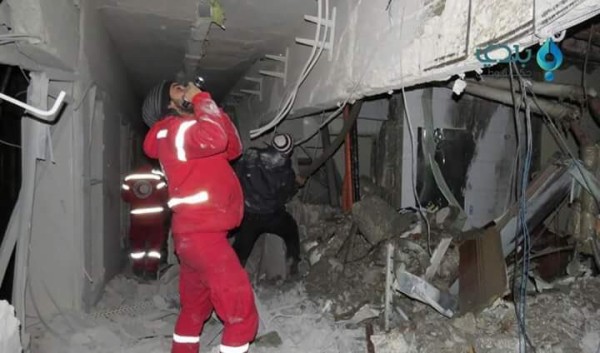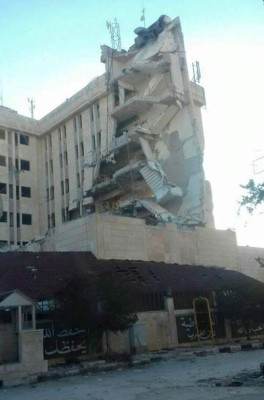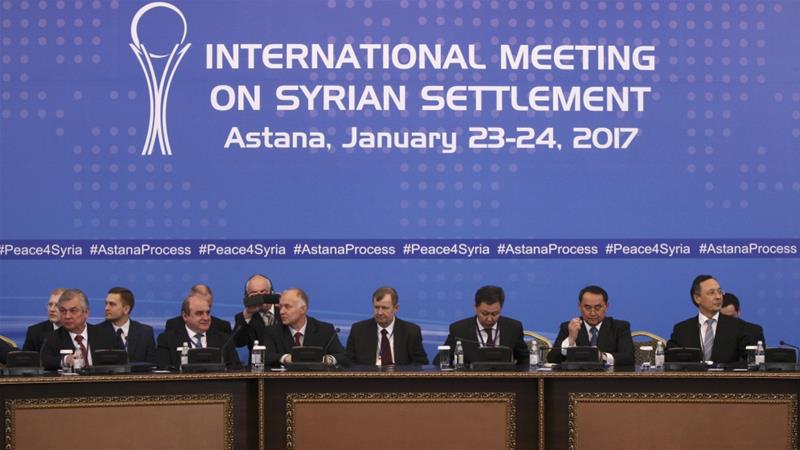PHOTO: Delegates at the opening phase of Syria’s political talks in Astana
LATEST
- Video: Regime Reporter Asks Hezbollah Fighter to Speak with “Syrian Dialect”
- Claims — US Airstrike Hits Hotel in Opposition-Held Idlib City
- UN Renews Airdrops to Regime Areas in Deir ez-Zor
- US Supplies Armored Vehicles to Kurdish-Led Force
WEDNESDAY FEATURE
Interview: Why Activism and Citizen Journalism Is Still Essential
The next round of political talks between the Assad regime and Syria’s opposition-rebels has been set for February 20 in Geneva, according to diplomats.
The talks would be the follow-up to last week’s discussions in the Kazakhstan capital Astana, brokered by Russia and Turkey. An opening session was marked by bitter exchanges between regime and opposition-rebel delegations. The two sides then spoke indirectly through Russian and Turkish officials.
There was no sign of progress. The opposition-rebel bloc called for a ceasefire, release of detainees, and end to sieges, but the head of the regime delegation, UN Ambassador Bashar al-Ja’afari, questioned the legimitacy of the opposition and said the regime would continue military operations.
Hezbollah and regime regime forces subsequently forced the capitulation of the Wadi Barada area, northwest of Damascus, with its al-Fija springs which supply more than 60% of Damascus’s water. They are continuing an assault on the East Ghouta area, northeast of the capital.
See Syria Daily, Jan 30: Rebels and Families Removed from Wadi Barada Near Damascus
Nevertheless Russia, Turkey, and Iran issued a statement nominally committing themselves to monitoring of a ceasefire. Moscow and Ankara have struck an effective deal for the partition of northern Syria, with Turkey accepting the pro-Assad recapture of all of Aleppo city in December and Russia acceding to a Turkish-rebel offensive which has taken parts of Aleppo Province from the Islamic State.
Last Friday, Russian Foreign Minister Sergei Lavrov met an “opposition” composed of politicians favored by Moscow. The opposition-rebel bloc said it had turned down the invitation to join the session.
See Syria Daily, Jan 27: Russia Meets Alternative “Opposition”
The Geneva talks will be formally under UN auspices, although the timing has been led by Russia. Moscow initially set the session for February 8 but delayed it for unspecified reasons.
Video: Regime Reporter Asks Hezbollah Fighter to Speak with “Syrian Dialect”
Footage of Shadi Hulwe, a reporter for regime media, asking a fighter from Lebanon’s Hezbollah to speak with a “Syrian dialect”:
"Cut, cut, cut"#Syria TV's Shadi Helwe directs 'news report' in #Aleppo Countryside, asks #Hezbollah fighter to speak in #Syria dialect pic.twitter.com/NaTgea5rHO
— Riam Dalati (@Dalatrm) February 1, 2017
Claims — US Airstrike Hits Hotel in Opposition-Held Idlib City
Claims are circulating that a US airstrike has hit the Carlton Hotel in opposition-held Idlib city.
The hotel includes the local center of the Syrian Arab Red Crescent, including clinics, and offices of other NGOS.
A local civil defense spokesman said that — while the building partially collapsed and fires were ignited — four SARC volunteers were only “lightly wounded”.
The SARC later confirmed that the head of the Idlib branch — initially said to have been seriously wounded, possibly killed — suffered a “light head injury”.
Pro-opposition activists say the Americans may have been targeting a vehicle or position of Hay’at Tahrir al-Sham — the recently-formed coalition of Jabhat Fatah al-Sham and some rebel factions — near the hotel.
@CJTFOIR strike vs reported @SYRedCrescent facility in #Idlib City around 0100 GMT,several reported injured, side of building 'irreparable' pic.twitter.com/51WzpnrrkM
— Riam Dalati (@Dalatrm) February 1, 2017
Photos show external and internal damage to the building:


Meanwhile, pro-opposition activists report that Russian and regime warplanes are continuing their attacks in Idlib Province, despite Russia’s declarations of a ceasefire since December 30.
S. #Idlib: massive explosion caused by a #RuAF airstrike on Khan Sheikhoun yesterday. Today the city is bombed again. pic.twitter.com/oINxsVOCBZ
— Qalaat Al Mudiq (@QalaatAlMudiq) February 1, 2017
UN Renews Airdrops to Regime Areas in Deir ez-Zor
The UN has restarted airdrops of food to regime-held areas in Deir ez-Zor in eastern Syria.
The airdrops to the area, with almost 100,000 people, were halted on January 15 amid an Islamic State offensive which cut the regime territory in and near Deir ez-Zor city in two, overrunning the drop zone used for 177 air drops since April.
World Food Program spokeswoman Bettina Luescher said deliveries resumed on January 29 with a new drop zone for two operations so far.
A total of 3,340 tonnes of food and other humanitarian aid have been dropped since last April. During the interruption in January, regime helicopters have brought in some food and medicine, mainly for soldiers, and evacuated wounded troops. A private Syrian company also airlifted 24 tons of potatoes and onions into the city for sale at comparatively expensive prices.
The bakery in the regime part of Deir ez-Zor city has also stopped working because of a lack of flour and fuel. Russian helicopters brought in two days of bread supplies about two weeks ago.
The Islamic State offensive this month cut off two eastern neighborhoods with 6,000 people, who cannot reach the hospital or receive food or fuel. They drink untreated water, drawn from the river at night to avoid ISIS attacks from the opposite bank.
US Supplies Armored Vehicles to Kurdish-Led Force
The US is supplying armored vehicles to the Kurdish-led Syrian Democratic Forces fighting the Islamic State in northern Syria, an SDF spokesman said Tuesday.
Some analysts said the supply order was one of the last actions of President Barack Obama before he left office on January 20. However, SDF spokesman Talal Silo said it was due to the incoming Trump Administration.
“Previously we didn’t get support in this form, we would get light weapons and ammunition,” Silo said.”There are signs of full support from the new American leadership — more than before — for our forces.”
Since the creation of the SDF in autumn 2015, the US has shifted almost of its military assistance from rebels to the Kurdish-led force. The SDF advanced in its initial months against ISIS, moving across northeast Syria and west of the Euphrates River, including the capture of the town of Manbij in June 2016.
However, in recent months the SDF has been held outside the Islamic State’s key position in Syria, the city of Raqqa, by military and political considerations.
Turkey considers the Kurdish Democratic Unity Party (PYD) and its YPG militia, which leads the SDF, as part of the Turkish Kurdish insurgency PKK. Ankara has demanded that the SDF withdraw east of the Euphrates.
A Kurdish military source said on Tuesday that the next phase of the Raqqa campaign will aim to seal off all remaining roads to the city and cut the route to ISIS positions in Deir ez-Zor in eastern Syria. The SDF is reportedly within 1 km (.6 mile) of the Euphrates Dam to the west of the city.
A Pentagon spokesman played down the delivery of the armor, saying there was no change of policy. Saying the vehicles were to help against the threat of improvised explosive devices, he pointedly avoided reference to Kurdish leadership by not mentioning the SDF by name.
“The Department of Defense only provides training and materiel support to the Syrian Arab Coalition,” Major Adrian J.T. Rankine-Galloway said.

